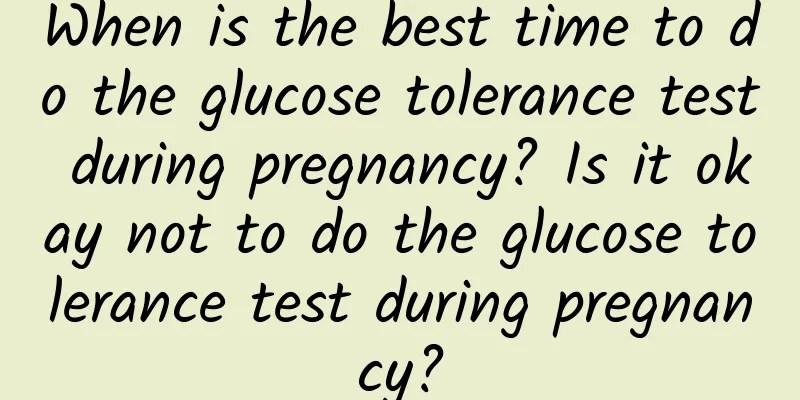What happens if pregnant women have frequent uterine contractions?

|
A woman's body functions will undergo many changes after she becomes pregnant. In the middle and late stages of pregnancy, uterine contractions and fetal movements will occur. Many women who are pregnant for the first time are particularly nervous about uterine contractions. In fact, uterine contractions are a normal physiological phenomenon after pregnancy. The frequency of uterine contractions will gradually increase with the development of the baby. After the due date, if the uterine contractions accelerate, you should pay attention to whether you are about to go into labor. This article introduces the relevant content, let’s take a look. 1. When will uterine contractions become frequent? The closer to the end of pregnancy, the higher the frequency will be. This kind of contraction is like a prenatal uterine exercise. The frequency is irregular, non-cyclical, and painless. The expectant mother herself will not feel uncomfortable, and usually this kind of contraction will disappear automatically. 2. How to judge whether frequent uterine contractions are dangerous Although frequent uterine contractions do not necessarily mean that the expectant mother is in danger, pregnant mothers must not take it lightly! The number of weeks of pregnancy and the type of uterine contractions are the two important bases for determining whether the pregnant mother and fetus are in danger. Frequent uterine contractions, if they occur after 37 weeks of pregnancy, indicate that birth is imminent. Expectant mothers can first evaluate themselves to see if this uncomfortable condition can resolve on its own. If not, then they should first evaluate the frequency of uterine contractions. If a pregnant mother with her first child experiences pain more than three times within ten minutes, or a pregnant mother with her second or subsequent child experiences pain once within ten minutes, then they should go to the hospital to assess whether they need to be hospitalized for delivery. Because the fetus is full-term at this time, not premature. In addition, if water breaks, vaginal bleeding is heavy, or fetal movement is significantly reduced after 37 weeks of pregnancy, you need to go to the hospital for examination as soon as possible. If frequent uterine contractions occur between 20 and 37 weeks of pregnancy, you should pay more attention and prevent premature birth. 3. Internal causes of frequent uterine contractions 1. Inflammation and infection in the uterus (the most common cause). 2. Placental abnormalities: such as placenta previa and placental abruption. 3. Uterine abnormalities: such as polycornuate uterus and uterine fibroids. 4. The uterus is too large: for example, pregnancy with multiple babies or excessive amniotic fluid. 5. Incomplete cervical occlusion (painless cervical dilatation). 6. The expectant mother smokes and drinks. 7. The expectant mother has a disease: such as gestational hypertension, thyroid problems, and autoimmune diseases. 8. The expectant mother has a history of premature birth. |
<<: Can artificial insemination lead to ectopic pregnancy?
>>: Will abortion cause endometrium thinning?
Recommend
How to treat vulvar leukoplakia best
Vulvar leukoplakia definitely needs treatment, bu...
Girls have abdominal pain
After girls enter puberty, they should pay specia...
What medicine should pregnant women take for gastritis
Pregnant women are prone to many uncomfortable re...
Why do children wet the bed? If they still wet the bed frequently after the age of 5, you should pay attention!
Bedwetting refers to involuntary urine leakage du...
Can soaking your feet in winter really help you stay healthy?
When the cold winter comes, we are exhausted phys...
Is non-invasive testing accurate at 13 weeks?
Every pregnant woman should have accurate control...
What is the use of the OFF button on a car? What does the A button on a car mean?
In daily life, many people may often come into co...
The following people are not suitable for myopia surgery for the time being
In the clinic, we often encounter students who ar...
Prenatal education and precautions for pregnant women in the fifth month
Nowadays, the issue of five-month fetal education...
Why do pregnant women have hot palms?
Once a woman becomes pregnant, various conditions...
Is it easy to get pregnant again after medical abortion?
Medical abortion is a way for women to terminate ...
What to do if you have breast discharge
Breast disease is the most common disease among w...
Fetal nasal bone length standard comparison table
What is the standard value of the fetus's nos...
Why does a woman have a stomachache?
Most women have abdominal pain, so what is the ca...
Leucorrhea during the luteal phase is mostly pregnancy
Secretion is a physiological activity of female f...









